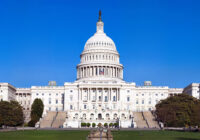“One nation, under God,” however you wish to define God, providing you believe unwaveringly.
Today’s 3D Definition: Faith
The Washington Post offers this headline of an article on a California congressman: “This lawmaker isn’t sure that God exists. Now, he’s finally decided to tell people.”
In the same article we learn that “the number of members who decline to offer a description of their faith identity has bounced between five and 10 since the 1960s, according to the Pew Research Center.” Apart from the fact that the author of the article doesn’t know whether she has faith in numbers (“five”) or digits (“10”), the meaning of the notion of faith — as it is used here — highlights a serious problem with the definition of that word in US political culture.
Here is its 3D definition:
Faith:
For most of humanity, an intellectual and emotional identification with a particular tradition that refers to or invokes supernatural or mystical forces. In the US, the public act of avowing that one is absolutely and incontrovertibly sure of something that is, by definition, uncertain and unprovable, a requirement that such a person is competent to serve in government.
Contextual note
As a news story, we suppose that if one congressman “isn’t sure that God exists,” we are expected to presume that all or most of the others are “sure.” The Pew Research Center mentions “faith identity,” signifying the traditions that particular office holders follow. But the notion of faith in the Christian tradition was first defined by St Paul in the Christian Bible (Hebrews, 11.1): “Faith is the substance of things hoped for, the evidence of things not seen.”
In other words, in the that same Christian tradition — which tends to be the reference in the officially non-denominational government of Washington as defined in the Constitution — faith is a choice that individuals make to “hope” for what they cannot be sure of. Not being sure would thus be the foundation of faith, in the process Søren Kierkegaard described as the “leap of faith.”
In a very literal sense, if one was “sure” of one’s religious convictions, it would no longer be faith. But The Washington Post assumes that a congressman who is not “sure” is an exception. Can it be that Jared Huffman is the only congressman with faith in the traditional Christian sense? But more significantly, can American voters really have confidence in legislators who are sure of everything they believe?
Historical note
The Constitution mentions religion only once, in Article VI, Section 3, where it states that “no religious Test shall ever be required as a Qualification to any Office or public Trust under the United States.” As with many phenomena in the United States, the government may be prevented from doing what citizens decide to do despite the constitutional restriction. Voters tend to test candidates on the basis of their religion, in particular requiring some proof of commitment to a “faith,” if only to be able to conclude their public speeches with, “God bless America.”
*[In the age of Oscar Wilde and Mark Twain, another American wit, the journalist Ambrose Bierce, produced a series of satirical definitions of commonly used terms, throwing light on their hidden meanings in real discourse. Bierce eventually collected and published them as a book, The Devil’s Dictionary, in 1911. We have shamelessly appropriated his title in the interest of continuing his wholesome pedagogical effort to enlighten generations of readers of the news.]
The views expressed in this article are the author’s own and do not necessarily reflect Fair Observer’s editorial policy.
Photo Credit: Sergey Nivens / Shutterstock.com
Support Fair Observer
We rely on your support for our independence, diversity and quality.
For more than 10 years, Fair Observer has been free, fair and independent. No billionaire owns us, no advertisers control us. We are a reader-supported nonprofit. Unlike many other publications, we keep our content free for readers regardless of where they live or whether they can afford to pay. We have no paywalls and no ads.
In the post-truth era of fake news, echo chambers and filter bubbles, we publish a plurality of perspectives from around the world. Anyone can publish with us, but everyone goes through a rigorous editorial process. So, you get fact-checked, well-reasoned content instead of noise.
We publish 2,500+ voices from 90+ countries. We also conduct education and training programs
on subjects ranging from digital media and journalism to writing and critical thinking. This
doesn’t come cheap. Servers, editors, trainers and web developers cost
money.
Please consider supporting us on a regular basis as a recurring donor or a
sustaining member.
Will you support FO’s journalism?
We rely on your support for our independence, diversity and quality.






